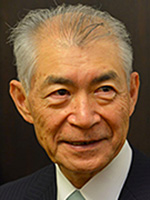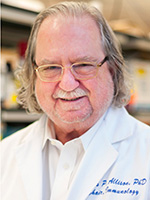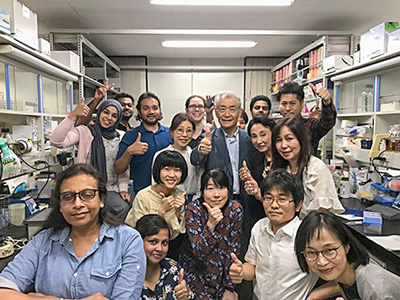News
Tasuku Honjo and James Allison for 2018 Nobel Prize in Medicine Updated in December 2018
On October 1, the Karolinska Institute in Sweden announced that they will grant the 2018 Nobel Prize for Medicine to Tasuku Honjo, Distinguished Professor at Kyoto University. Prof. Honjo discovered a protein that can hit the brake against immune response. This will pave the way for developing a revolutionary treatment for cancer. “Whenever a patient tells me how they were saved, or that he or she were saved because of me, it is exhilarating to realize that my research was actually meaningful,” mentioned Prof. Honjo during the evening press conference held at Kyoto University. He hoped for further acceleration of basic medical research that can be linked to clinical solutions.
Other Japanese researchers who received the Nobel Prize in Medicine are Satoshi Omura (2015) and Yoshinori Osumi (2016). There were no candidates in 2017, but three candidates received the Nobel Prize in four years. Going back further, the total number of Nobel Prize recipients from Japan in all categories have reached 26. He is the fifth recipient in Medicine to succeed Yoshinori Osumi (2016), Satoshi Omura (2015), Shinya Yamanaka (2012), and Susumu Tonegawa (1987),
The co-recipient is Prof. James P. Allison at University of Texas. The award ceremony will be held in Stockholm on December 10, and a prize of 9 million Krona (equivalent to 115 million yen) will be granted to the two recipients.
Prof. Honjo was born in January 1942 in Kyoto. He graduated from Kyoto University Medical School and its Graduate School of Medicine. From professor of medicine at Osaka University (1979), he became professor at Kyoto University Medical School and a visiting professor at Kyoto University (2005). In 2017 he has assumed the position of Distinguished Professor. Although he had made many accomplishments in molecular immunology, he had paved the way to a new immunotherapy in 1992 with the discovery of PD-1 on the surface of a T-cell. He has resolved PD-1’s function to put a brake on immune response. PD-1 led to a new anticancer drug Opdivo. Opdivo is often used for skin or lung cancer and has demonstrated effectiveness in many clinical treatments.
From the government of Japan, Prof. Honjo was awarded as a Person of Cultural Merit in 2000 and received the Order of Culture in 2013. He has served as the head of Faculty of Medicine at Kyoto University, and a member of the Council for Science, Technology and Innovation (CSTI – advisory board to the Prime Minister). He is also a member of the Japan Academy.
For Japan Science and Technology Agency (JST), Prof. Honjo collaborated in the 2014 CREST* project “How gut microbiota shifts metabolites leading to neuro-endocrine disorders in mouse and man” and had acted as research supervisor to one of JST’s 2005 regionally integrated collaborative project “Developing Basic Technology for Building a Nanomedicine Hub (for Kyoto-shi).” *JST CREST: Core Research for Evolutional Science and Technology










